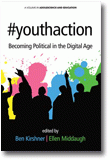
#youthaction
Becoming Political in the Digital Age
Edited by:
Ben Kirshner, University of Colorado School of Education
Ellen Middaugh, Mills College
A volume in the series: Adolescence and Education. Editor(s): Daniela K. DiGiacomo, University of Kentucky. Erica Van Steenis, University of California Irvine.
Published 2014
Social media and digital tools permeate the everyday lives of young people. In the early stages of commentary about the impact of the digital age on civic life, debates revolved around whether the Internet enhanced or discouraged civic and political action. Since then we have seen new media move to center stage in politics and activism--from the 2008 US election to the 2011 Arab Spring to the Occupy movement. We have also seen new patterns in how different sub-groups make use of digital media. These developments have pushed people to move beyond questions about whether new media are good or bad for civic life, to ask instead: how, under what conditions, and for whom, do new digital tools become resources for political critique and action by the young?
This book will provide a platform for a new wave of scholarship about young people’s political participation in the digital age. We define “youth” or “young people” as roughly between the ages of 12 and 25. We include perspectives from political science, education, cultural studies, learning sciences, and youth development. We draw on the framework developed by the MacArthur Research Network on Youth and Participatory Politics (Cohen, Kahne, Bowyer, Middaugh, & Rogowski, 2012), which defines participatory politics as, “interactive, peer-based acts through which individuals and groups seek to exert both voice and influence on issues of public concern.”
CONTENTS
Foreword, Biko Baker. Educating Powerful Citizens in a Changing World, Ellen Middaugh and Ben Kirshner. And the Weapon of Choice Was, McCrae Adams Parker. Phones Aren’t Smart Until You Tell Them What to Do, Elisabeth Soep. Leveraging New Media and Youths’ Repertoires of Practice toward Connected Learning, Kris D. Gutiérrez, Althea Scott Nixon, and Jevon D. Hunter. COMPUGIRLS Speak: How We Use Social Media for Social Movements, Mitzi Vilchis, Kimberly A. Scott, and Courtney Besaw. “Son Enough”: Developing Girls’ Agency in India across Domestic and Civic Spheres through Feminist Media Practice, Glynda Hull, Mark Jury, and Urvashi Sahni. Lost, Sweaty, and Engaged in Dialogue: The Civic Opportunities of Geospatial Play, Antero Garcia and Ellen Middaugh. Dialogue across Difference: A Case Study of Facing History and Ourselves’ Digital Media Innovation Network, Justin Reich, Anna L. Romer, and Dennis Barr. Blogging as Civic Engagement: Developing a Sense of Authority and Audience in an Urban Public School Classroom, Katherine Schultz, Erica Hodgin, and Johanna Paraiso. The Making of a Global Citizen: A Model of Supporting Civic Learning Opportunities among Urban Latino Youth, Brendesha M. Tynes and Vanessa Monterosa. Politically Engaged and Alienated Youth: Reevaluating 2010 UK Student Protests, Allen L. Linton. Sustaining Innovation: Lessons for Digitally Mediated Civic Education, Ellen Middaugh.
-
Paperback9781623967956
Web price: $45.04 (Reg. 52.99)
-
Hardcover9781623967963
Web price: $80.74 (Reg. 94.99)
- eBook9781623967970

- EDU000000 - EDUCATION: General
- EDU038000 - EDUCATION: Student Life & Student Affairs
- EDU029000 - EDUCATION: TEACHING METHODS & MATERIALS: General
-
 Black Girl Civics
Expanding and Navigating the Boundaries of Civic Engagement
Black Girl Civics
Expanding and Navigating the Boundaries of Civic Engagement
-
 Educating Adolescents
Challenges and Strategies
Educating Adolescents
Challenges and Strategies
-
 Peer Relationships and Adjustment at School
Peer Relationships and Adjustment at School
-
 Power, Equity and (Re)Design
Bridging Learning and Critical Theories in Learning Ecologies for Youth
Power, Equity and (Re)Design
Bridging Learning and Critical Theories in Learning Ecologies for Youth
-
 Self-Efficacy Beliefs of Adolescents
Self-Efficacy Beliefs of Adolescents
-
 The Changing Landscape of Youth Work
Theory and Practice for an Evolving Field
The Changing Landscape of Youth Work
Theory and Practice for an Evolving Field
-
 The Ones We Remember
Scholars Reflect on Teachers Who Made a Difference
The Ones We Remember
Scholars Reflect on Teachers Who Made a Difference

